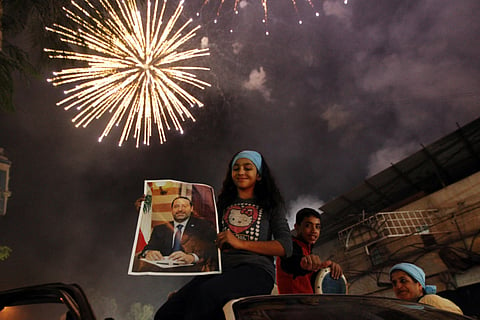Hariri frustrated by ministerial portfolio demands
Mercantile Lebanese elite position themselves to grab lucrative posts

Beirut: Prime Minister-designate Saad Hariri is engaged in traditional horse-trading negotiations with President Michel Aoun, Speaker Nabih Berri, and others, both to complete the formation of his national unity cabinet as well as satisfy a motley-crew anxious to reap benefits from their most recent political compromises.
Local media sources revealed Hariri’s frustrations with the process, with some underscoring how unrealistic these demands were. Apparently, three specific portfolios complicated talks, and are delaying his wish to complete the task over the next 72 hours.
According to Al Jumhuriyyah daily, Hariri is emphasising the necessity to accept a turnover of several key posts, including finance, defence and foreign affairs, though the real fight is over the energy and telecommunications ministries because those are seen as financial goldmines to officeholders.
For now, the prime minister-designate seemingly believes that a quick resolution of pending differences will help accomplish key issues and translate the oath of office into effective results. Towards that end, he sought and reportedly received pledges from both Lebanese Forces leader Samir Geagea and Progressive Socialist Party boss Walid Jumblatt, to facilitate his mission.
The pro-Hezbollah daily Al Safir reported on Thursday that the Speaker insisted the finance ministry must remain with his Amal bloc, clarifying: “the Ta’if Accords stipulate that it should be part of the Shiite sect’s share on the basis that the finance minister’s signature on decrees is the only Shiite signature in the executive authority”.
Both of the Free Patriotic Movement and the LF expressed a desire to fill the finance post but were willing to negotiate alternatives that raised the ante. One of the alternatives put forward by the LF is to let Amal keep the Ministry of Finance in exchange for the Ministry of Defense, something that Hezbollah rejected. The Ministry of Interior is expected to remain with Hariri’s Future Movement.
Hariri will now sort these opposing views and submit his list to President Aoun, whose first few days in office were preoccupied with a slew of protocol visits. Though the presidential election glow continues to permeate over Lebanon, few expect dramatic transformations in the near future, even if the October 31 coronation occurred only after Saad Hariri switched his backing from Suleiman Franjieh.
Hariri’s endorsement of Aoun unravelled Hezbollah’s obstructionist steps, and while the party declined to endorse the Future Movement leader for the premiership, it entrusted negotiations to Speaker Berri. He must now demonstrate patience to reach the next stages, and as important as the cabinet challenge is, the Prime Minister-designate must also winnow through the government’s policy statement, which will not only have to make a reference to Israel, but must also tackle the ongoing civil war in Syria, both of which are potential flashpoints with Hezbollah.
Lebanon’s wary citizens are anxious for Aoun and Hariri to succeed, and are awaiting a government that will tackle various challenges, including how to restart a stagnant economy.
In the past, the policy statement focused on key economic matters and included the wooden triptych of the “army-people-resistance” formula to defend the country, which the LF dismissed, although Aoun and Hariri (along with the LF that will now be entrusted a vital cabinet post) must reformulate to find the right balance. Will the triptych survive intact and, in the affirmative, will that bode well for Hariri’s anticipated national unity government?


